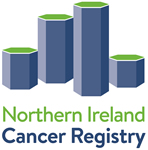Background

Project Background
Internationally, survival from lung and colorectal cancer in the UK is poor[i] (see fig 1) with the largest excess mortality occurring in early months[ii],[iii]. One in three lung cancer patients and one in eight (12%) colorectal cancer patients in Northern Ireland (NI) die within 8 weeks of diagnosis[iv].
European survival comparisons indicate 10,438 avoidable deaths if mean European survival could be achieved in Britain[v].
Poor survival is linked with late stage at diagnosis[vi], poor patient fitness due to coexisting disease and also availability of and access to high quality services. The proportion of colorectal cancers diagnosed with the earlier Dukes A and B disease in UK registries was low while the proportion of first month deaths was high[vii]. Late stage disease is associated with lower surgical resection rates as treatment options are limited and also, possibly linked to patient fitness or access to specialist surgery. Evidence that 43% of patients with colon cancer present as an emergency in NI[viii] is suggestive of potential in improving survival through earlier diagnosis given emergency admission is a clinically important marker of poorer prognosis[ix], [x].
In Lung cancer most patients present with late disease[xi]. Only 11% of lung cancer patients in NI were suitable for surgery with curative intent, similar to that of the UK wide data presented in the LUCADA audit[xii]. In NI, survival rates for surgical patients diagnosed in 2006 were 74% at 21 months much higher than the average survival. The importance of surgical resection to survival has also been evidenced elsewhere in the UK[xiii]. Low surgical rates may be attributed to co-morbidities and reduced capacity for curative treatments[xiv],[xv]. A study in NI showed that 29% of lung cancer patients had Chronic Obstructive Pulmonary Disease, 34% had heart disease while 50% had at least one of these co-morbidities. 11.
It is not currently possible to assess the relative contribution of late diagnosis, patient fitness and access to specialist surgery to low resection rates in the UK15. Whilst expediting diagnosis is desirable[xvi], it is important to further enhance our limited understanding of the relationships between risk factors for delay which may lie with the disease, the patient or the services they access. The goal here is to identify factors which are more common in the patients who die early with a view to determine factors which might help identify groups for early diagnosis interventions.
Reasons for diagnostic delay in colorectal cancer are well documented[xvii]. A systematic review of 54 studies into pre-hospital risk factors for delayed colorectal cancer diagnosis[xviii] identified risk factors for patient-mediated delay including lower education while serious symptoms such as pain reduced time to diagnosis. Psychosocial factors which were associated with diagnostic delay included fear, embarrassment and not recognising symptom seriousness. Patient/practitioner-mediated factors linked to diagnostic delay included patient lower socio-economic status, frequent care seeking, inadequate investigations while application of referral guidelines, older patient age and presence of co-morbidities were associated with shorter delay. Similar findings were identified for Lung cancer18,[xix], [xx], [xxi], [xxii].

